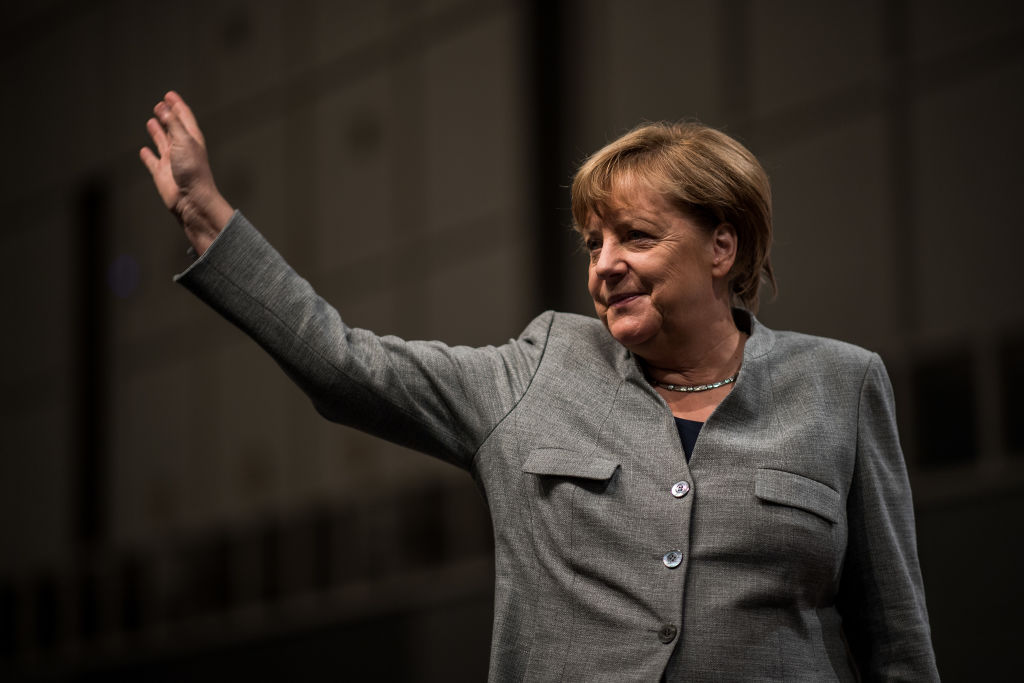With the German elections now barely a month away, the Bundesrepublik remains beset by worries about terrorism and immigration. Yet, just like the river in the song, the German economic juggernaut just keeps rolling along. The latest GDP figures are even better than expected – 0.6 per cent growth in the second quarter – the best year on year rate since 2014, and the twelfth consecutive quarter in which the German economy has grown.
Other Eurozone countries have reported healthy figures, too. France grew by 0.5 per cent, and Spain reported a rise of 0.9 per cent – its strongest result for three years (the British economy grew by 0.3 per cent in the same period). The Eurozone may be ‘a German racket designed to take over the whole of Europe’ (as Nicholas Ridley predicted in The Spectator all those years ago) but so long as Germany keeps on growing, the economies of its neighbours will grow with it.
Gross Domestic Product isn’t the only good news for Germany. Unemployment is at its lowest since the Berlin Wall came down, and the government has posted a budget surplus for the last three years (last year’s €24bn (£21bn) surplus was the biggest since reunification). The reasons for Deutschland’s economic success are myriad, but a cheap currency is a big part of it. Without the Euro, Germany would still be saddled with a super-strength currency like the Swiss Franc – fantastic for pensioners, but a nightmare for exporters.
Naturally, this is good news for nearly everyone (no country stands to gain from a German recession, least of all the UK) but for Germany’s Social Democratic Party, it’s another sign that next month’s election is as good as lost. The latest polls bear this out: the SPD is becalmed on 25 per cent; Angela Merkel’s Christian Democratic Union is on 37 per cent. In a system of Proportional Representation, with half a dozen political parties, that twelve point lead is huge.
When Martin Schulz became leader of the left-leaning SPD in March, his supporters had high hopes he would win back the Chancellorship from Merkel (a crown she’s held since 2005, when she defeated the last SPD Chancellor, Gerhard Schroeder). Yet less than six months later, his campaign seems increasingly beleaguered. So what went wrong?
Schulz’s problem is that as a result of Merkel shifting her party towards the centre, he now has no room for manoeuvre – except on the hard left. Her handling of the economy is hard to fault and her social policies are uncontroversial. Her Achilles Heel is immigration, and the consequent anxieties about crime and terrorism, but it’s far easier to attack these failings from the right than from the left. In Britain, Merkel’s CDU is usually described as conservative, but that’s a term Christian Democrats rarely use to describe themselves. They’re really far more centrist, a party for continental Tory Wets. ‘Die Mitte’ (The Middle) is the campaign slogan that’s served them best.
The CDU has suffered in the past from its stuffy, old-fashioned image, but Merkel has made her CDU more modern, cleansing it of its ‘nasty party’ tag without losing its core support. Last month’s vote on Gay Marriage was a perfect case in point. Merkel declared her ardent opposition to this bill yet allowed a free vote of conscience on the issue, knowing full well it would pass. The SPD found itself in an impossible position. Schulz could hardly criticise her for opposing legislation which she herself had enabled. Unlike Boris Johnson, she was able to have her cake and eat it.
Consequently, the only wriggle room for Schulz has been well to the left of the SPD’s traditional voters, and this shift has already cost his party at the polls. This summer’s defeat in the regional elections in North Rhine Westphalia (Germany’s most populous state, and a historic SPD stronghold) was widely attributed to worries among soft left voters that the SPD would team up in parliament with Germany’s socialist party, Die Linke.
As a figure from outside the Bundestag, untainted by the backroom deals and awkward compromises that attend coalition politics, the SPD had hoped that Schulz might appeal to disillusioned voters outside the mainstream – even some of those who’ve voted in such large numbers for Germany’s anti-immigration party, Alternative für Deutschland. However, as a former President of the European Parliament, it’s hard to portray Schulz as an anti-establishment figure, and with no position in the Bundestag, he lacks a natural platform from which to make his voice heard. As Germany’s last SPD Chancellor, Gerhard Schroeder might be expected to lend Schulz a helping hand on the campaign trail. However, since leaving office in 2005, Schroder has established close links with the Russian energy industry, which has tainted his reputation. He’s served as a board member on various consortia in which Gazprom is a major shareholder, and was recently nominated as an independent director of Rosneft – Russia’s largest oil company, in which the Kremlin has a controlling stake. All of these activity has not gone unnoticed by the German public. Stephan Bierling, Professor of international politics at the University of Regensburg, has said that ‘by becoming a well-paid official of a foreign aggressive power, he has damaged the reputation of the political class more than any other living politician.’ Ironically, it was Schroeder’s painful but essential labour reforms which drove the SPD out of office, and paved the way for Angela Merkel’s current Wirtschaftswunder. It’s an irony that won’t be lost on the SPD’s Martin Schulz, as he prepares for next month’s electoral defeat.





Comments